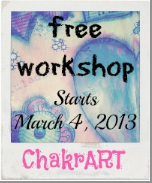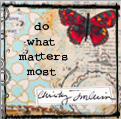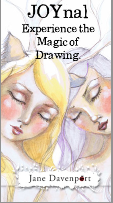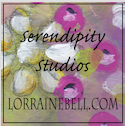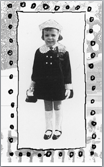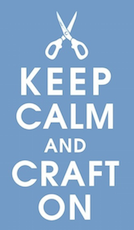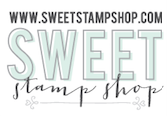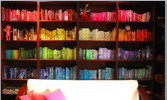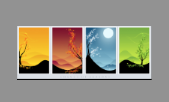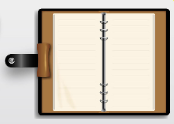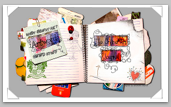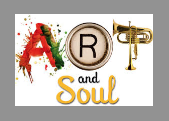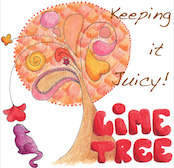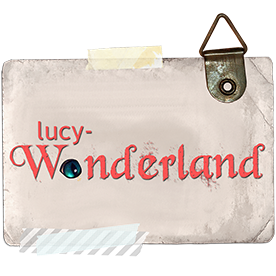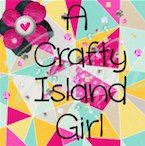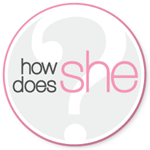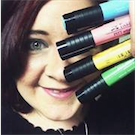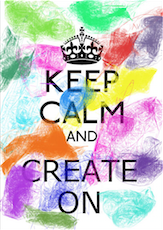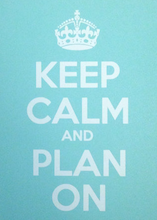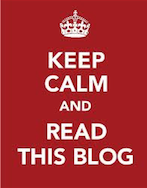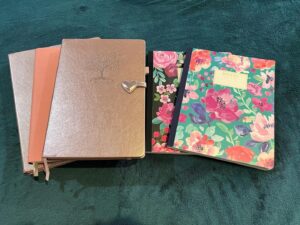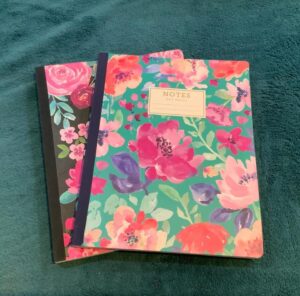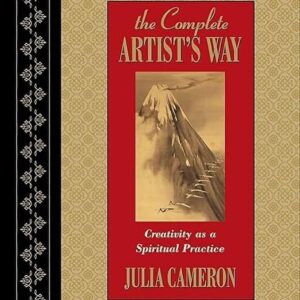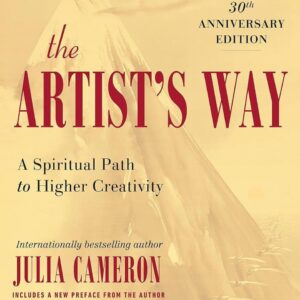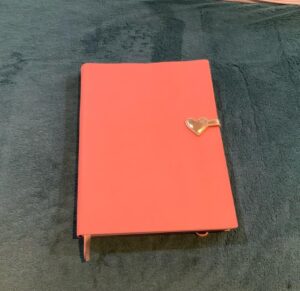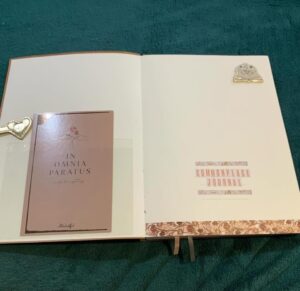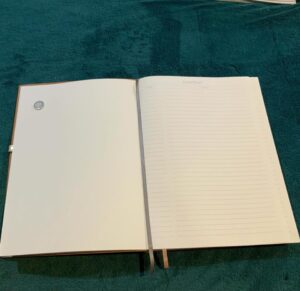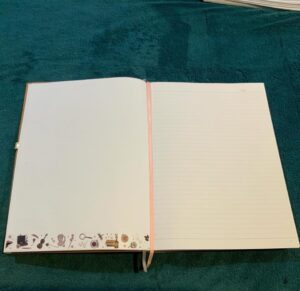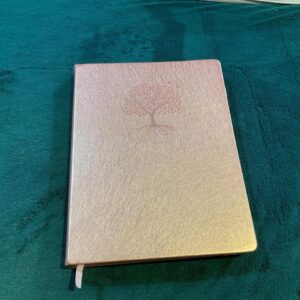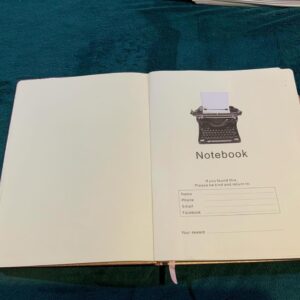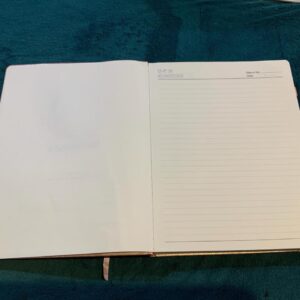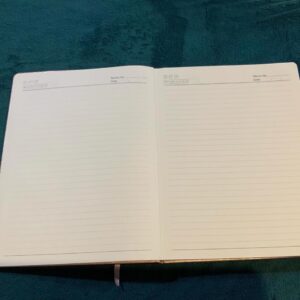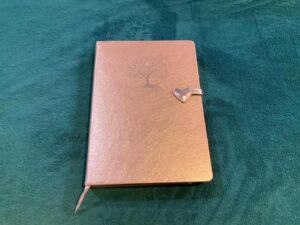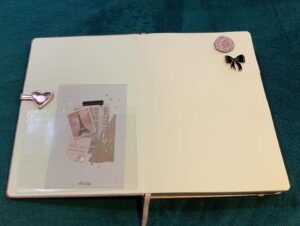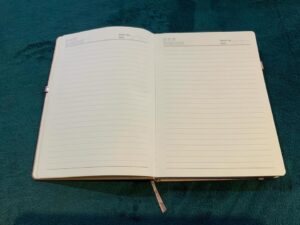Writing and Journaling Line Up: Personal Journaling, Common Place Journal, Writers Notebook, Morning Pages, and Evening Pages. I will post each one separate with details. Journals and notebooks were purchased at Amazon and Walmart.
Morning and Evening Pages:
Morning Pages:
The bedrock tool of a creative recovery is a daily practice called Morning Pages. Morning Pages are three pages of longhand, stream of consciousness writing, done first thing in the morning. *There is no wrong way to do Morning Pages*– they are not high art. They are not even “writing.” They are about anything and everything that crosses your mind– and they are for your eyes only. Morning Pages provoke, clarify, comfort, cajole, prioritize and synchronize the day at hand. Do not over-think Morning Pages: just put three pages of anything on the page…and then do three more pages tomorrow. (Description from https://juliacameronlive.com)
Evening Pages:
Doing pages in the evening is journaling, allows us to reflect on our day. (This is not a recommendation as a replacement of Morning Pages. This is for your personal journaling and reflection. I just want to make it a practice to do both. Julia Cameron recommends morning pages. I’ve read in other sources that there is benefits from journaling and reflection, it is beneficial for personal growth too.)
Notebooks were purchases at Walmart for the pages are the right size to write 3 pages a day for me.
Amazon Links two book choices for The Artist’s Way by Julia Cameron:
Commonplace Book (Commonplace Notebook, Commonplace Journal)
Historically a commonplace book would be a collection of thoughts/ideas/excerpts collected by somebody for their use later. It could include journaling as well. Essentially hand-written scrapbooks, they could be filled with items of every kind: quotations, poetry, letters, summaries of sermons heard or books read, prayers and proverbs, tables of weights and measures, legal formulas, mathematical calculations, anything, in fact, that the writer wished to have recorded for future reference. (Description from Google)
You Tube has a variety of videos about the uses of a commonplace book. I love saving quotes, positive statements and content that promote change and growth. Anything that inspires me or moves is worth wring down.
I’m going to call mine a Commonplace Journal. This notebook is a B5, purchased at Amazon.
Writer’s Notebook
Keeping a writer’s notebook is a great way to stay organized and make sure you never lose a drop of inspiration again. Your Writer’s Notebook is about writing and working on your writing ideas.
It’s a place to mind dump for all the things that make you a writer – character biographies, settings notes, sketches, doodles, snippets of dialogue and narration, poems, thoughts and feelings about your story, and so on.
Ask yourself questions about the story you are trying to create and write all your ideas.
The size will be a personal preference depending on portability.
My notebooks is A4 or letter size, purchased at Walmart. I will most likely carry mine in a tote bag with all my journals and planners.
Personal Journal 📖 🖊️
I will be journaling for personal growth which means I will be journaling in a way that both helps me reflect on my past thoughts and actions with an eye toward the future. I will do this through free-writing and/or with prompts in my journal.
My journal that I am using is a B5 that I purchased from Amazon.
If your new to journaling, here are some tips to get started and to make journaling into a manageable habit:
📖 Select any journal or notebook that is comfortable and affordable to you and use your favorite pens.
📖 Commit to 5-10 minutes of journaling a day
📖 Journal at the same time every day, and at a time you know you’ll actually do it.
📖 Don’t put pressure on yourself to write about anything specific. If you don’t have a specific topic you want to address, try free-writing for five or ten minutes, or journal on a specific prompt.
📖 If you can’t journal every day, be realistic about that, and commit to three days a week
I like to collect prompts on a variety of topics that I hope to share over time. Use these 10 journaling prompts to help you get started:
🖊️ What’s something that pushes you outside your comfort zone?
🖊️ What does your perfect day look like? Write it down from start to finish.
🖊️ What three words describe your dream life?
🖊️ Name five things you’re looking forward to this week or this month.
🖊️ At what point during the day are you at your most productive or energetic? How can you make better use of that time?
🖊️ What apps do you use most often on your phone? Are they adding or taking value from your life?
🖊️ Write a letter to someone you love letting you know how much you appreciate them.
🖊️ Think back to a difficult period in your life. What advice would you give to your younger self?
🖊️ What self-care activities bring you the most joy or sense of calm? How can you incorporate them into your life this week?
🖊️ Write down a joyful memory from the past week.





